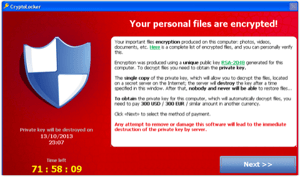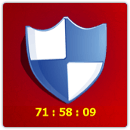Share this
Don’t Let CryptoLocker Steal Your Data for Christmas
by Bridget.Giacinto on Dec 10, 2013 8:43:13 PM
 CryptoLocker is a ransomware Trojan horse that is holding victims' data for ransom. This is a new type of malware that is targeted to computers running on Windows operating systems. The CryptoLocker malware is being spread through phishing emails that are disguised as legitimate-looking business emails with phony FedEx and UPS tracking notices or email attachments. Businesses should be on high alert as this malware poses a real threat warranting official warning alerts from both Britain’s National Crime Agency (NCA) and the US Homeland Security Computer Readiness Team.
CryptoLocker is a ransomware Trojan horse that is holding victims' data for ransom. This is a new type of malware that is targeted to computers running on Windows operating systems. The CryptoLocker malware is being spread through phishing emails that are disguised as legitimate-looking business emails with phony FedEx and UPS tracking notices or email attachments. Businesses should be on high alert as this malware poses a real threat warranting official warning alerts from both Britain’s National Crime Agency (NCA) and the US Homeland Security Computer Readiness Team.
Once a computer is infected, CyberLocker ransomware encrypts computer files. The CryptoLocker malware was designed to search for and encrypt files, not just on your computer, but also on any connected drives, including shared network drives, USB drives, external hard drives, network file shares, and even cloud storage devices. If one system on your network becomes infected, mapped network drives also run the risk of becoming infected.
 After files have been encrypted, CyberLocker issues victims a three-day ransom notice (tracked through a 72-hour countdown timer) demanding payment in exchange for a private decryption key. If the $300 or €300 ransom is not paid (through a third-party payment method like MoneyPak or Bitcoin) within the given time period, the private key will be destroyed and they claim no one will ever be able to recover the encrypted files.
After files have been encrypted, CyberLocker issues victims a three-day ransom notice (tracked through a 72-hour countdown timer) demanding payment in exchange for a private decryption key. If the $300 or €300 ransom is not paid (through a third-party payment method like MoneyPak or Bitcoin) within the given time period, the private key will be destroyed and they claim no one will ever be able to recover the encrypted files.
Because the decryption key is a unique private key, victims can’t just use someone else’s key to decrypt their files. To make matters worse, some victims have reported that they paid the attackers and still did not receive the promised private decryption key. The only real solution is prevention.
How to Protect Your Computer Network from a CryptoLocker Infection
The best proactive, preventative measure you can take is to conduct a regular backup of your data and to maintain up-to-date anti-virus scans on your computers. Backup software like NovaBACKUP will not only back up your data on a consistent automated schedule, but it also does an antivirus scan of your data to ensure that your backups are virus-free. As part of your backup routine, we recommend storing at least one copy of your critical backup files offline. If your computer does become infected, immediately disconnect wired or wireless systems from your network. This may prevent further encryption of files on your network.
Preventative Measures
There are a few additional preventative measures that can be taken to protect your data. In addition to backup up your data, you should also update your operating system with the latest patches. This act alone could prevent the malware from finding its way onto your computer through unnoticed holes in the software’s security. Once virus authors find holes in the security of the operating system, other malware authors like CryptoLocker use them to gain access without having to reinvent the wheel.
Do not follow web links in emails that are unsolicited or questionable and please use caution when opening emails with attachments, especially if you do not recognize the sender. Trust your instincts. If something about an email or email attachment just doesn’t seem right, don’t open it. If in doubt, you could always contact the person who sent you the email to make sure it is legitimate before opening it. It’s better to be safe than sorry.
It may also be time to review the access settings on your network shares, both at work and at home. If a user doesn’t need write access to certain files, don’t permit them. This is a great preventative action that will prevent the virus from finding and encrypting additional files as it appears to not be able to attack files with read-only access.
If your system becomes infected with CryptoLocker, the first thing you want to do is run a virus scan on your computer. This will not decrypt the files that CryptoLocker has already encrypted, but it will stop CryptoLocker from continuing to encrypt more files on your system. It will also allow you to restore your files from your backup without these files also becoming subject to malware encryption.
Don’t let CryptoLocker be the Grinch that stole your data ... back it up now. If you do not currently use backup software to protect your data, now is the time to start. NovaBACKUP is a comprehensive, award-winning Windows backup software solution that is both easy to use and affordable. NovaBACKUP also includes Setup Assistance with their backup software solution.
Share this
- Pre-Sales Questions (109)
- Tips and Tricks (96)
- Industry News (57)
- Reseller / MSP (37)
- Best Practices (31)
- Security Threats / Ransomware (29)
- Applications (26)
- Disaster Recovery (26)
- Cloud Backup (24)
- Compliance / HIPAA (24)
- Backup Videos (23)
- Storage Technology (23)
- Virtual Environments (17)
- Infographics (8)
- Technology Updates / Releases (8)
- Backup preparation (5)
- Products (US) (3)
- Company (US) (1)
- Events (1)
- Events (US) (1)
- December 2024 (1)
- November 2024 (1)
- October 2024 (1)
- September 2024 (2)
- August 2024 (1)
- July 2024 (2)
- June 2024 (2)
- May 2024 (1)
- April 2024 (1)
- March 2024 (2)
- February 2024 (2)
- January 2024 (1)
- December 2023 (1)
- November 2023 (1)
- October 2023 (1)
- September 2023 (1)
- August 2023 (1)
- July 2023 (1)
- May 2023 (1)
- March 2023 (3)
- February 2023 (2)
- January 2023 (3)
- December 2022 (1)
- November 2022 (2)
- October 2022 (2)
- September 2022 (2)
- August 2022 (2)
- July 2022 (1)
- June 2022 (1)
- April 2022 (1)
- March 2022 (2)
- February 2022 (1)
- January 2022 (1)
- December 2021 (1)
- November 2021 (1)
- September 2021 (1)
- August 2021 (1)
- July 2021 (1)
- June 2021 (1)
- May 2021 (2)
- April 2021 (1)
- March 2021 (2)
- February 2021 (1)
- January 2021 (1)
- December 2020 (1)
- November 2020 (1)
- October 2020 (2)
- September 2020 (4)
- August 2020 (2)
- July 2020 (1)
- June 2020 (1)
- May 2020 (1)
- April 2020 (1)
- March 2020 (3)
- February 2020 (2)
- January 2020 (2)
- December 2019 (1)
- November 2019 (1)
- October 2019 (1)
- August 2019 (1)
- July 2019 (1)
- June 2019 (1)
- April 2019 (1)
- February 2019 (1)
- January 2019 (1)
- December 2018 (1)
- November 2018 (2)
- August 2018 (3)
- July 2018 (4)
- June 2018 (2)
- April 2018 (2)
- March 2018 (2)
- February 2018 (2)
- January 2018 (3)
- December 2017 (1)
- September 2017 (1)
- May 2017 (2)
- April 2017 (5)
- March 2017 (4)
- February 2017 (1)
- January 2017 (1)
- December 2016 (1)
- November 2016 (1)
- October 2016 (2)
- September 2016 (1)
- August 2016 (3)
- July 2016 (2)
- June 2016 (2)
- May 2016 (7)
- April 2016 (8)
- March 2016 (1)
- February 2016 (3)
- January 2016 (12)
- December 2015 (7)
- November 2015 (5)
- October 2015 (6)
- September 2015 (2)
- August 2015 (3)
- July 2015 (2)
- June 2015 (2)
- May 2015 (1)
- April 2015 (4)
- March 2015 (3)
- February 2015 (4)
- January 2015 (2)
- October 2014 (4)
- September 2014 (8)
- August 2014 (5)
- July 2014 (7)
- June 2014 (3)
- May 2014 (3)
- April 2014 (9)
- March 2014 (7)
- February 2014 (7)
- January 2014 (5)
- December 2013 (4)
- October 2013 (7)
- September 2013 (2)

